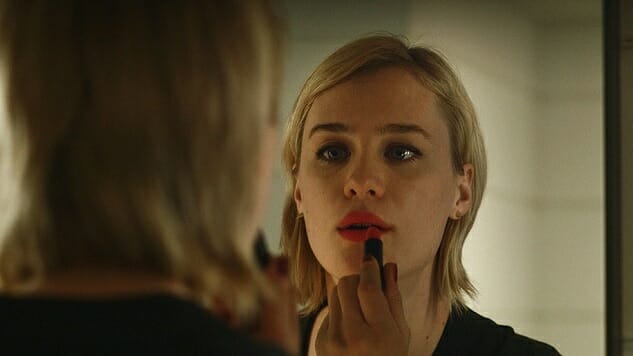Talking about the first and second acts of Sophia Takal’s Always Shine without talking about the third is a challenge. The film begins as a story of mounting personal and professional grievances between two friends and shifts into mindfuck territory just shy of half an hour before the ending credits scrawl. That pivot impacts the narrative immediately and drastically, giving us the sense that someone swapped reels and stuck us with a trippier, shorter Always Shine remake. But neither Takal nor writer Lawrence Michael Levine mean to mess with the audience just for the hell of it, because gimmickry for gimmickry’s sake is cheap and Always Shine has higher aspirations than deceptive schlockery.
The film is one part road trip movie, one part frenemy drama, and one part industry critique as sort-of chums Beth (Caitlin FitzGerald) and Anna (Mackenzie Davis) zip off to Big Sur to bond with each other after drifting apart for months. They’re both actresses, but Beth’s star is on the rise while Anna’s is stuck in neutral: People recognize Beth in public and pose for pictures with her, and Anna sits off to the side, ignored and invisible. Always Shine cleanly sets up this dichotomy in its first 10 or so minutes, introducing both women one at a time using neutral shot sequences where they talk straight into the camera before Takal cuts away to show us exactly who they’re talking with.
Beth is at a movie audition, and she’s talking to the highfalutin dudebros producing the picture. Anna, by contrast, is arguing with her mechanic for performing unauthorized maintenance on her car, which is like auditioning for her dignity. “Ma’am, there’s no need to raise your voice,” the prick tells Anna as she deflects his half-assed excuses for the oopsie, just before he doubles down on his mansplaining with naked misogyny: “If you were a touch more ladylike….” You half expect her to implode on the spot. It’s the first of several injustices dealt to Anna throughout the film’s duration, though the others each occur directly in relation with Beth, and these each cut deeper than routine sexism. Men like Beth. She’s attractive, she gives the appearance of innocence, she smiles habitually, and she’s quietly bubbly. Men don’t quite like Anna as much because she’s the exact opposite of these things, and to the guys she meets those qualities read as threatening.
Always Shine isn’t about male emasculation per se, but the ways its principals interact with male characters are integral to the story’s primary conflict. Just as Anna begrudges Beth her slow-rolling success, so too does she resent the attention accorded her by men. It sounds much grosser on paper than it plays in practice. Takal doesn’t feel any need to validate her leads through their encounters with the opposite sex, but rather she sees these encounters as smaller components that make up part of the whole of the film’s female rivalry. If Anna felt secure in her career, would she care as much that the older fellow she and Beth meet at a bar is more interested in Beth than in her? How about the opposite? Male gazes do influence the shape of Always Shine’s plot, but much more central to that is Anna’s self-doubt coupled with Beth’s anxiety.
Takal punctuates the film with horror movie grammar, whether in setting or in style. It’s always bad news when a movie compels its human beings to attend a cabin in the woods, especially when those humans know of their own accord that the surrounding area lacks cell coverage, so Anna and Beth get off to a shaky start that becomes downright wobbly with just a shift in setting. Also troubling are the flashes between the film’s present and what we presume to be its future. Takal occasionally slows down Anna and Beth’s dialogue and plays it in reverse, or flits from their chatter to the sights and sounds of struggle. These aggressive editing choices hint at where Always Shine ends up going, though nothing substantial enough to give away the reveal.
Always Shine is about women coming apart at the seams. Takal’s approach to stitching the film together gives the impression of a psyche slowly coming undone. The results don’t quite add up to “horror,” but they include more than a few horrifying beats suffused with overarching surrealism. This is the kind of movie that has the decency to let its audience know it’s mucking around with their perception, though that doesn’t make it less magnetically bizarre. Takal brings a welcome candor to her filmmaking, much as Davis and FitzGerald both find rich veins of truth in their respective roles. Always Shine is a gem of a film, a haunting, sobering depiction of female relationships couched within male-dominated spaces.
Director: Sophia Takal
Writer: Lawrence Michael Levine
Starring: Mackenzie Davis, Caitlin FitzGerald, Lawrence Michael Levine, Alexander Koch, Jane Adams
Release Date: Dec. 2, 2016
Boston-based critic Andy Crump has been writing about film online since 2009, and has been contributing to Paste Magazine since 2013. He also writes for Screen Rant, Movie Mezzanine, and Birth. Movies. Death., and is a member of the Online Film Critics Society and the Boston Online Film Critics Association. You can follow him on Twitter and find his find his collected writing at his personal blog. He is composed of roughly 65 percent craft beer.
